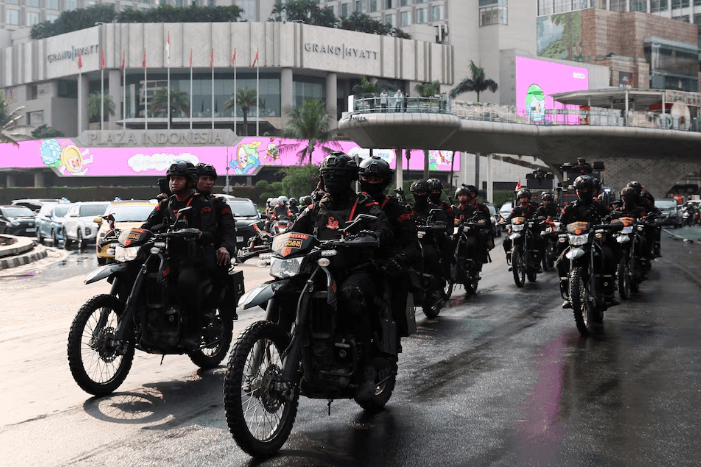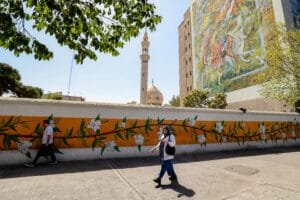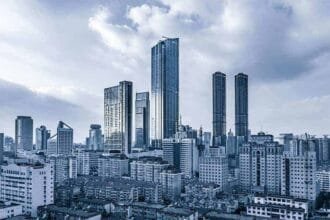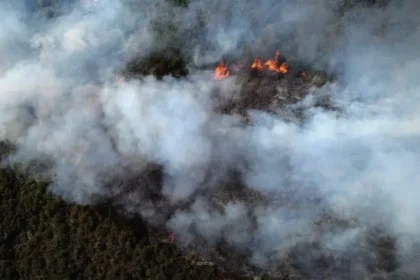Jakarta, Indonesia – Hundreds of students gathered in major Indonesian cities on Monday for demonstrations. These demonstrations defied fears of a crackdown on protests. This comes after bloody riots over the weekend that resulted in the tragic loss of eight lives. It marks the worst violence the Southeast Asian country has witnessed in over two decades.
The protests, which began a week ago, were initially fueled by concerns about government spending priorities. This was particularly the improvement of lawmakers’ privileges. However, the situation escalated into riots and looting. This happened after a police car struck a motorcycle taxi driver, leading to his unfortunate demise. The homes of members of political parties, including the Minister of Finance, were also targeted by looting.
Government buildings were also looted or burned in these demonstrations. This poses the biggest challenge to President Prabowo Subianto’s government since his inauguration approximately a year ago.
In an attempt to appease the protesters, President Prabowo announced a reduction in MPs’ privileges on Sunday, a significant concession. However, he emphasized the firmness of security forces in enforcing law and order.
The heavy military-led security presence has prompted some organizers to postpone gatherings in Jakarta. Nevertheless, student protesters continued to gather in Jakarta, as well as at Indonesia’s Yogyakarta Cultural Center. They also gathered in the city of Makassar, which witnessed the most severe violence during the weekend.
The tragic loss of life has been a stark reminder of the devastating impact of the riots. At least four individuals were killed in mob arson and violence during previous demonstrations.
The rally in Makassar was situated near the local parliament building, which tragically burned down on Friday.
A student group leader from Makassar State University expressed dissatisfaction with President Prabowo’s statement made the previous day. The leader stated that it failed to address the demands of students and civil society.
The leader, who prefers to remain anonymous, further elaborated that the students also hold deeper demands. These include comprehensive police reform.
The protests and violence have had a profound impact on financial markets as the demonstrations continued. It caused the stock market to experience a significant decline of over 3% during opening trading on Monday. However, it recovered slightly afterward.
To prevent further escalation and maintain stability, efforts are being made. The aim is to address the underlying issues and find peaceful solutions to the ongoing unrest.
To avoid Escalation
Earlier, students and civil society organizations in Jakarta canceled their planned protests.
The city’s police chief reported that over 1,200 protesters had been arrested in Jakarta shortly after the demonstrations.
The Indonesian Women’s Alliance, a coalition of women-led civil society organizations, postponed their planned protests in parliament. They did this to avoid any potential crackdown by authorities.
In an Instagram post on Sunday, the group explained that the delay was made to prevent further violent escalation by the authorities. The delay will remain until the situation stabilizes.
Student groups also postponed their protest on Monday, citing “extremely impossible circumstances” as the reason for their decision.
Army patrols were observed on major roads in Jakarta.
Traffic congestion was also reported due to the decision of many companies to allow work-from-home. The continuation of online classes in schools contributed as well.
Social media posts from some groups warned of fake protest calls and urged people to exercise caution.
Finance Minister Sri Mulyani Indrawati confirmed in an Instagram post that she had been a victim of looters during the demonstrations. She called on people not to loot and apologized for the government’s shortcomings.
The capital’s governor, Pramono Anong, reported that over 700 people had been injured in the demonstrations. Additionally, infrastructure damage worth £3.4 million was recorded from last week’s protests in Jakarta.
Chief Economy Minister Erlanga Hartarto stated on Monday that eight people had lost their lives in the protests. However, Hartarto emphasized that the economy is fundamentally strong and will benefit from the planned stimulus package.
In a note on Indonesia on Monday, rating agency Standard & Poor’s noted that the protests are unlikely to escalate to the point of undermining political stability. However, the agency also warned of potential policy adjustments that could add a financial burden to the government.
The memo suggested that one possible outcome of the demonstrations could be increased social spending to support middle- and low-income groups. This change, in turn, could lead to a rise in the fiscal deficit, approaching the legal limit of 3% of GDP.

















